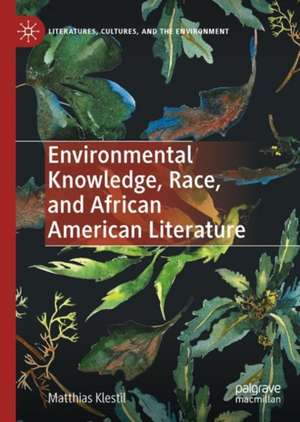Environmental Knowledge, Race, and African American Literature: Literatures, Cultures, and the Environment
Autor Matthias Klestilen Limba Engleză Hardback – 21 apr 2023
Din seria Literatures, Cultures, and the Environment
- 18%
 Preț: 624.52 lei
Preț: 624.52 lei - 20%
 Preț: 692.36 lei
Preț: 692.36 lei -
 Preț: 388.72 lei
Preț: 388.72 lei -
 Preț: 386.81 lei
Preț: 386.81 lei - 15%
 Preț: 582.95 lei
Preț: 582.95 lei - 18%
 Preț: 727.97 lei
Preț: 727.97 lei -
 Preț: 385.84 lei
Preț: 385.84 lei - 15%
 Preț: 705.18 lei
Preț: 705.18 lei -
 Preț: 417.30 lei
Preț: 417.30 lei - 18%
 Preț: 950.21 lei
Preț: 950.21 lei -
 Preț: 389.88 lei
Preț: 389.88 lei - 15%
 Preț: 584.58 lei
Preț: 584.58 lei - 15%
 Preț: 523.22 lei
Preț: 523.22 lei - 15%
 Preț: 521.60 lei
Preț: 521.60 lei - 15%
 Preț: 581.47 lei
Preț: 581.47 lei - 15%
 Preț: 693.25 lei
Preț: 693.25 lei - 18%
 Preț: 887.24 lei
Preț: 887.24 lei - 15%
 Preț: 641.71 lei
Preț: 641.71 lei - 18%
 Preț: 786.66 lei
Preț: 786.66 lei - 18%
 Preț: 783.81 lei
Preț: 783.81 lei - 18%
 Preț: 787.15 lei
Preț: 787.15 lei - 18%
 Preț: 950.33 lei
Preț: 950.33 lei -
 Preț: 391.61 lei
Preț: 391.61 lei - 15%
 Preț: 583.13 lei
Preț: 583.13 lei - 18%
 Preț: 1001.32 lei
Preț: 1001.32 lei
Preț: 700.75 lei
Preț vechi: 824.41 lei
-15% Nou
Puncte Express: 1051
Preț estimativ în valută:
134.11€ • 139.49$ • 110.71£
134.11€ • 139.49$ • 110.71£
Carte tipărită la comandă
Livrare economică 15-29 aprilie
Preluare comenzi: 021 569.72.76
Specificații
ISBN-13: 9783030821012
ISBN-10: 3030821013
Pagini: 307
Ilustrații: VIII, 307 p.
Dimensiuni: 148 x 210 mm
Greutate: 0.53 kg
Ediția:1st ed. 2023
Editura: Springer International Publishing
Colecția Palgrave Macmillan
Seria Literatures, Cultures, and the Environment
Locul publicării:Cham, Switzerland
ISBN-10: 3030821013
Pagini: 307
Ilustrații: VIII, 307 p.
Dimensiuni: 148 x 210 mm
Greutate: 0.53 kg
Ediția:1st ed. 2023
Editura: Springer International Publishing
Colecția Palgrave Macmillan
Seria Literatures, Cultures, and the Environment
Locul publicării:Cham, Switzerland
Cuprins
1. Introduction: African American Environmental Knowledge at Niagara.- Part I Foundations: Antebellum African American Environmental Knowledge.- 2. Claiming (through) Space: Topographies of Enslavement, the Literary Heterotopia of the Underground Railroad, and the Co-Agency of the Non-human.- 3. Resisting (through) the Eye: Antebellum Visual Regimes, the Slave Narrative’s Rhetoric of Visibility, and African American Strategic Pastoral.- 4. Negotiating (through) the Skin: The Black Body, Pamphleteering, and African American Writing against Biological Exclusion.- Part II Transformations: African American Environmental Knowledge from Reconstruction to Modernity.- 5. Transforming Space: Nature, Education, and Home in Charlotte Forten and William Wells Brown.- 6. Transforming Vision: The Pastoral, the Georgic, and Evolutionary Thought in Booker T. Washington.- 7. Transforming the Politics of the Black Body: Trans-corporeality, Epistemological Resistance, and Spencerism in Charles W. Chesnutt.- 8. Conclusion: African American Environmental Knowledge at Yellowstone.
Notă biografică
Matthias Klestil is Postdoctoral Assistant in American Studies at the University of Klagenfurt, Austria. His research focuses on African American literature and culture, ecocriticism, and narrative theory.
Textul de pe ultima copertă
This open access book suggests new ways of reading nineteenth-century African American literature environmentally. Combining insights from ecocriticism, African American studies, and Foucauldian theory, Matthias Klestil examines forms of environmental knowledge in African American writing ranging from antebellum slave narratives and pamphlets to Charlotte Forten’s journals, Booker T. Washington’s autobiographies, and Charles W. Chesnutt’s short fiction. The volume highlights how literary forms of environmental knowledge in the African American tradition were shaped by the histories of slavery and race, mainstream environmental writing traditions, and African American forms of expression and intertextuality. Turning to the Underground Railroad, debates over education and home-building, and the aesthetics of the pastoral and the georgic, Environmental Knowledge, Race, and African American Literature provides an original perspective on the African American ecoliterarytradition that uncovers new facets of canonical and understudied texts and offers new directions for ecocriticism and African American studies.
Caracteristici
Provides an in-depth study of the African American environmental literary tradition Draws attention to archival material and a range of under-researched texts Enables fresh perspectives on canonical African American authors of the antebellum period This book is open access, which means that you have free and unlimited access
